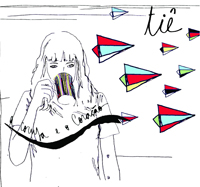
Review Tiê – A Coruja e o Coração
A Coruja e o Coração is Tiê‘s second album, and it’s a very different beast to that first offering. Sweet Jardim was a quiet, serene album that saw her billed as part of a new bossa nova movement. A Coruja e o Coração adds country, 70s pop and bluegrass to that sound.
This description of Sweet Jardim never really worked because the album didn’t have a great deal to do with bossa nova, it was a hushed pop album that had one ear to Brazilian pop and the other to the rest of the world. On A Coruja e o Coração the international pop flavour is the characteristic that shines through.
The album begins with “Na Varanda da Liz,” a big George Harrison (produced by Jeff Lynne) ballad (it’s intro actually sounds uncannily like Travelling Wilbury’s “Handle With Care.”) The verse has a very similar feel to Low or Aimee Mann, and this is something that recurs across the album. Tiê’s voice is an ephemereal thing lacking the power of contemporaries like Tulipa or Karina Buhr. This is what made the first album so sparse. Here, she has upped the production, adding strings, vocal harmonies and a variety of instrumentation, while also layering up her own voice. This gives the album a much bigger sound, and “Na Varanda da Liz” is the best example of this.
The second song is a cover of “Só Sei Dancar Com Voce” which reveals the difference between her’s and Tulipa’s voice. The original was ever so haunting in Tulipa’s original, Tiê opts to add accordion and banjo which give the song a French flavour the original only hinted at. These instruments crop up again in “Pra Alegrar o Meu Dia” and “Hide and Seek,” which reveal a certain love for bluegrass. “Piscar O Olho” continues the US country theme, though in more of a Bright Eyes vein.
 It almost feels as if this album has gone out of its way not to be labelled as bossa nova. The only possible allusion is on the Baden Powell goes Mexican vibe of “Voce Nao Vale Nada.” Aside from this it’s US indie bands such as Low, Beirut and Sufjan Stevens that seem like obvious influences, as well as echoes of other São Paulo-based singers. “Já É Tarde” is the kind of effortless pop that Bárbara Eugênia also does so well.
It almost feels as if this album has gone out of its way not to be labelled as bossa nova. The only possible allusion is on the Baden Powell goes Mexican vibe of “Voce Nao Vale Nada.” Aside from this it’s US indie bands such as Low, Beirut and Sufjan Stevens that seem like obvious influences, as well as echoes of other São Paulo-based singers. “Já É Tarde” is the kind of effortless pop that Bárbara Eugênia also does so well.
As second album goes this is something of a triumph. An album that builds on the work of the first album, yet also shows some new directions. While it doesn’t completely hold together as a great album, it shows that all the pieces are there to produce something along these lines in the future. A Coruja e o Coração is the perfect remedy while waiting, with enough surprises like the funereal march of “Perto E Distante” or infectious English vocal melody of “For You and For Me” to keep the album sounding fresh for a while yet.
Follow Sounds and Colours: Facebook / Twitter / Instagram / Mixcloud / Soundcloud / Bandcamp
Subscribe to the Sounds and Colours Newsletter for regular updates, news and competitions bringing the best of Latin American culture direct to your Inbox.

